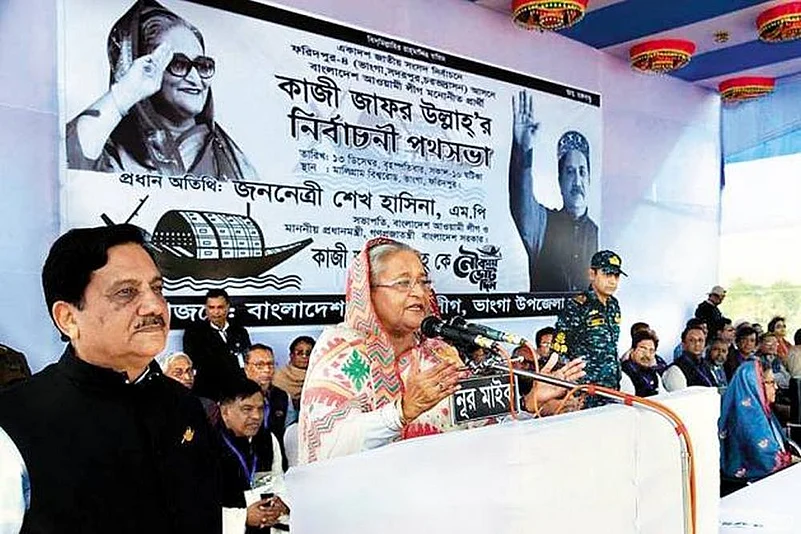The US is putting pressure on the Bangladesh government to allow 32 observers from the Asian Network for Free Election (ANFREL) to observe the national elections to be held on Sunday in the Asian country. But what has sent the Bangladesh authorities and security establishments into a tizzy is US ambassador Earl Robert Miller’s request to the Sheikh Hasina government for permission to meet the Bangladesh army chief, air chief and the naval chief ahead of the elections.
Miller met the Bangladesh chief election commissioner MK Nurul Huda in Dhaka on Thursday and discussed how to conduct a free, fair and peaceful election.
“His request to meet the army chief, air force chief and chief of the naval staff just days before the election, has caught us unawares…,” said a Bangladeshi official who is aware of the development.
Advertisement
“The US envoy’s meeting with the chief election commissioner on Thursday was ostensibly to take up the issue over the delay in granting a visa to 32 observers of the Asian Network for Free Election (ANFREL).”
The Bangladesh ministry of foreign affairs, in a statement, said: “Bangladesh is disheartened to see a press statement issued by the United States Department of State on 21 December 2018 on the upcoming national parliamentary elections to be held in a festive atmosphere on 30 December 2018.”
Bangladesh and Indian officials in Dhaka believe Miller's staff have been whipping up a furore in media over the delay in granting visas to the 32 observers of ANFREL. Accreditation of international election observers from a number of organisations including ANFREL is currently under process, the ministry of foreign affairs statement added.
Advertisement
“In this context, the decision of ANFREL to cancel its observation mission is entirely their own despite the fact that, nearly half of its applicants have already been approved and the rest is under process,” it further said.
The statement says ‘Odhikar’, an NGO from Bangladesh which is the founding member of ANFREL, is widely known for its bias and prejudice against the Awami League government in Bangladesh.
ANFREL is known to support the US-backed regimes.
Senior journalist and Bangladesh-watcher Subir Bhaumik says the US intelligence community is known for its not-so-subtle use of human rights groups to target regimes that are seen as not friendly to the Americans.
He says everybody knows that ANFREL is funded by the US State Department through the National Endowment for Democracy (NED), USAID and the Open Society Institution (OSI). Successive US administrations have made no secret of their dislike for Sheikh Hasina and the Awami League.
As secretary of state, Hilary Clinton tried to put pressure on Hasina to reinstate Bangladeshi social entrepreneur and banker Mohammed Yunus, not only because he was donating generously to the Clinton Foundation (something already well documented) but also because they had seen the Nobel Laureate’s potential as an American stooge, Bhaumik adds.
“They tried to boost him to bring down the two Begums during the 1/11 takeovers backed by the army. Yunus had announced his intention to float a new political party in a press conference in Calcutta, which I attended as a BBC correspondent,” he said.
Advertisement
The Pranab Mukherjee factor
Columnist KP Nayar, in his column--Aborted colour revolution: Untold story of how Pranab nipped in the bud a Hillary-favoured plan to unseat Hasina-- published in April 2017 in The Telegraph, wrote: “As the political temperature rose in Bangladesh on the Yunus issue, Mukherjee who was then finance minister in the UPA government…got a phone call from Clinton who, as Barack Obama's secretary of state, was taking a degree of interest in South Asia that was unprecedented by the standards of most of her predecessors."
Nayar in the article said Clinton made an impassioned plea that India should support Yunus in his bid to frustrate Hasina and her efforts to get Grameen Bank away from its founder.
Advertisement
“Clinton had gone so far as to suggest that Hasina would be an unreliable partner for India in the long run and that New Delhi should distance itself from the Prime Minister and throw its weight behind Yunus as the potential head of a national or technocrat government,” Nayar wrote.
“Mukherjee would hear none of it and asserted his faith and complete confidence in Hasina…Mukherjee assured Hasina that India would stand by her legally elected government and that she had nothing to fear,” he said in his column.



















